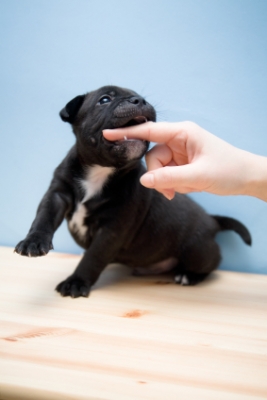Puppies Doin' Time

Sometimes people just can’t see the forest for the trees, and when it comes to puppy raising this can be a grave mistake indeed. Yesterday on Twitter, WellBalancedPup brought a letter to my attention that appeared in the ChicoER. In the editorial letter the author is enraged because she feels taken advantage of by the local animal control because she has to pay a fee to impound her puppy for a ten-day bite quarantine.
I too, was enraged by the decision to quarantine a young pup for nipping, but for different reasons entirely. Sure quarantine costs and municipal fines are costly and damage the pocketbook, but money comes and goes, it’s material. The true cost of this situation is far greater than losing a few bucks and the damages are much more difficult to recover.
Locking a puppy away in social isolation for 10 days out of its little life at this crucial developmental period can have detrimental long-term effects on a dog. The practice is both inhumane and foolish. What starts as bureaucratic baloney meant to keep the public “safe” becomes the first step to actually developing an adult dog that might someday pose a much more real threat to the public.
Newsflash - puppies have pointy, sharp teeth. Puppies bite - lot if we’re lucky.
Puppy biting is both inescapable and necessary in order for the pup to learn how to be gentle with his jaws by the time he’s an adult with a much more powerful and potentially damaging bite. Dogs use snapping and biting as a form of both communication and defense. It’s one way they tell us and other animals to back of when they are uncomfortable. All dogs are capable of biting and many will do so at some point in their life; this doesn’t make them “bad” dogs, it just makes them dogs.
Thankfully, due to bite inhibition acquired in puppyhood, all dog snaps do no damage and most dog “bites” do little to no damage. This is because most pups get plenty of practice biting their mum and littermates and new human family in the first four months of their lives. When pups bite others they get feedback from the bitee about the pressure of their bite and learn that gentle mouthing is okay but hard bites are not. Because puppy teeth are particularly sharp pups get lots of feedback about how it hurts when they bite, even with just a little bit of pressure and when it hurts others will bite back, squeal, stop playing with them, or, in the case of mum even stop nursing. So pups learn being gentle with their jaws is super-important!
Also, the first four months are a very important time in the life of a puppy. During this period puppy brains are like little sponges soaking up their first experiences and the environments they encounter. These early experiences help form the personality and behavior of the adult dog. The more good experiences a pup has and the more things a pup is exposed to in the first few months the more likely he’ll grow up to be a well-rounded, confident, and therefore “safe” dog. Pups need to meet tons and tons of people and get out and see the world as much as possible in these early weeks of their lives. Spending ten days in social isolation really sets them back socialization-wise. A dog that lacks proper socialization and has limited experiences in puppyhood is much more likely to grow up being fearful/reactive/defensive. And a dog that is fearful/reactive/defensive is much more likely to bite at some point in his life.
Dogs are quarantined for biting as a safety precaution for public health. This practice started mainly to prevent the spread of rabies. The thing is, the incubation period for rabies is often much longer than ten days. And the CDC reports that the U.S. is officially free of canine rabies at this point.
Ironically, in the case of young puppies, the required quarantine of ten days for a dog bite for public health and safety actually backfires in the case of a young puppy as a pup that is quarantined during this crucial developmental period is much more likely to become a menace to society as an adult dog than to spread a virtually non-existent disease to humans.
So I ask, why the outdated protocol? Isn’t it about time to reevaluate the rules for bite quarantine, especially when it comes to puppies? Puppy bites often break the skin and yet do little long-term damage; and most puppy bites go unreported anyways so the accuracy of reports is way off. There must be a better way.
For more common sense information on dog bites check out this amazingly clear book, Dog's Bite: But Balloons and Slippers Are More Dangerous, by Janis Bradley




